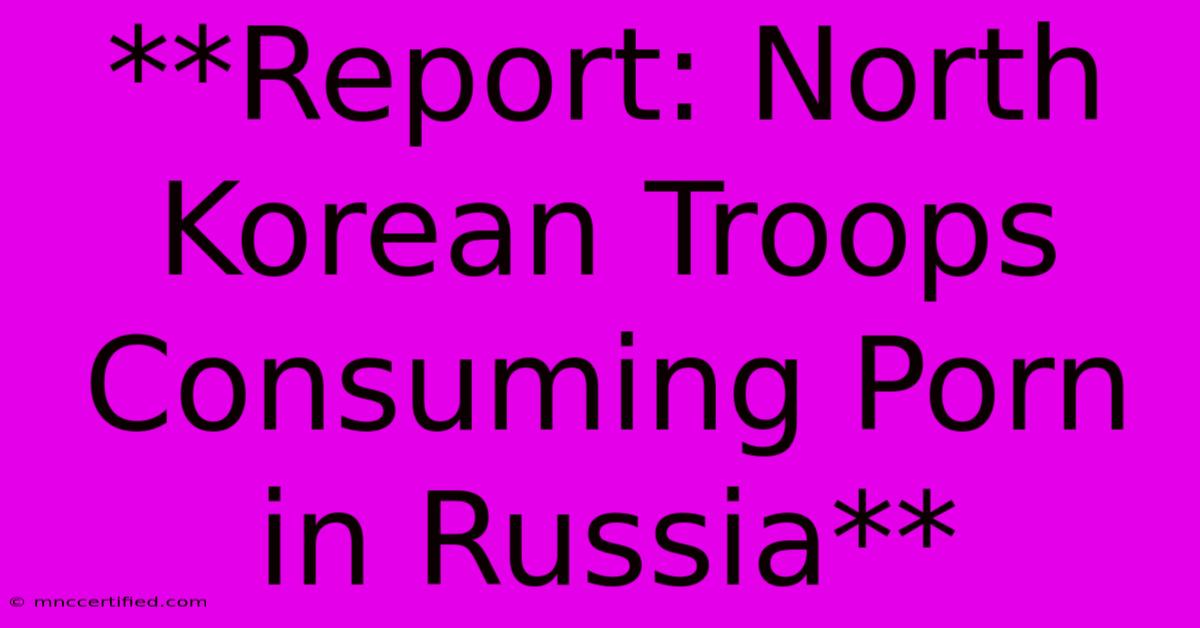**Report: North Korean Troops Consuming Porn In Russia**

Table of Contents
North Korean Troops Consuming Porn in Russia: Fact or Fiction?
The internet was abuzz with a report claiming that North Korean troops stationed in Russia were consuming pornography. This sparked a wave of intrigue and speculation, raising questions about the authenticity of the claim and its potential implications.
While the initial source of the report remains unclear, its spread through social media platforms like Twitter and Telegram suggests a potential for misinformation. Let's break down the report and analyze why we should tread cautiously before accepting it as factual.
The Report's Spread and Lack of Concrete Evidence
The report gained traction through online communities and social media platforms, primarily circulating in the form of unverified screenshots and anecdotal accounts. The lack of credible sources and verifiable evidence makes it difficult to ascertain the report's validity.
It's crucial to note that the internet is a breeding ground for misinformation and fabricated content. Reports circulating on social media should always be scrutinized and verified before being accepted as factual.
Potential Motivations and Concerns
The report's spread raises several potential motivations:
- Propaganda: The report could be a deliberate attempt to discredit North Korea or its military personnel. Spreading misinformation can be a tactic employed to undermine a country's reputation or influence public opinion.
- Clickbait and Sensationalism: The report's sensational nature could be a ploy to attract attention and generate clicks, especially on platforms that thrive on viral content.
- Cultural and Ideological Tensions: The report could be used to fuel existing tensions between North Korea and the international community, particularly regarding its rigid social control and restrictions on information access.
It's important to be aware of these potential motivations and avoid contributing to the spread of unverified information.
Importance of Critical Thinking and Fact-Checking
In the age of digital information overload, it's paramount to cultivate critical thinking skills and practice rigorous fact-checking.
When encountering online reports, especially those with sensitive or controversial content, it's essential to:
- Identify the source: Is it a reputable news organization, a verified individual, or an anonymous account?
- Verify the information: Search for corroborating evidence from multiple sources.
- Beware of clickbait and sensationalism: Be skeptical of reports designed to evoke strong emotions or grab attention.
Conclusion: Embracing Responsible Online Engagement
The report about North Korean troops consuming pornography in Russia highlights the importance of critical thinking and responsible online engagement.
While the report's authenticity remains uncertain, its spread underscores the need to be discerning consumers of online information. We must prioritize verifying information from credible sources and avoid contributing to the spread of misinformation.
As responsible digital citizens, we have a collective responsibility to promote accuracy and truth in the online sphere.

Thank you for visiting our website wich cover about **Report: North Korean Troops Consuming Porn In Russia**. We hope the information provided has been useful to you. Feel free to contact us if you have any questions or need further assistance. See you next time and dont miss to bookmark.
Featured Posts
-
Man Utd 2 0 Paok Post Match Stats
Nov 08, 2024
-
Aclu Watches Trumps 2024 Presidential Bid
Nov 08, 2024
-
Sentinel American Life Insurance Company
Nov 08, 2024
-
Carrington Mortgage Homeowners Insurance
Nov 08, 2024
-
Professional Indemnity Insurance Brokers
Nov 08, 2024